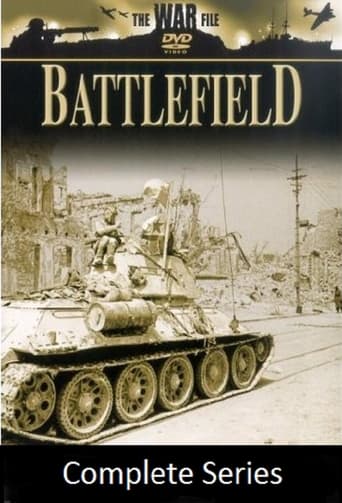DigIt
First I should say I'm a whole time WWII buffs, I've seen most of documentaries and films on the subject, played tactical and strategic war games (both on computers and tabletops); I have read a huge collection of books and I'm an expert modeler on this historical age subject and studied in detail weapons, uniforms, organizations etc. I had a chance to see this whole series and admittedly it deals with tactics and weaponry, but i.e. the images associated to the spoken text are quite often repetitive and even altogether wrong, belonging to other battles or weapons.The music is such a soporific electronic noise it can surely help you loose patience upon the relentless repetitions of images and text... It shows a very poor scripting and researches relative to the actual images of the battles they try to describe in depth; some few interesting and revealing information may be found even by the experts and historians, but to get them you have to go through a large amount of to say the least "boring editing". Great idea, but badly accomplished: even the 3d animated titles belong to the prehistoric age of CG and look like a less than professional and low budget production.I suggest you spare your time and stay away from it: look for some better documented and above all realized series and there are many.
TheEmulator23
This is an extremely well done series. The only complaint I have is the god-awful music throughout. It's terrible & the same in every single episode I've seen. Now that I've gotten that out of the way, I have absolutely nothing but praise for this fantastically knowledgeable & well put together series. There is so much about this that is both factual & entertaining at the same time. I would tell everyone to watch this superb series but especially those interested in WWII. Even for Historians of the era or Wannabe historians such as myself who know a ton about the period, there is still information that is quite interesting. I will say that those who just have a passing interest in WWII might not want to watch this as it's generally pretty in-depth for it's 1 hour 37 minute episodes. Give this a try, just ignore the bad music & learn.
Robert J. Maxwell
A respectful, adult, and logically laid-out presentation of strategic battles of World War II. An absence of talking heads is refreshing. The price paid for the distanced view this series takes is a lack of dramatic impact, but there's plenty of that elsewhere. Most viewers of any maturity will understand the human suffering behind the events that unfold on the screen.The narrative script seems devoid of prejudice. The war is treated as dispassionately as an historic chess game. There are no easy shots taken, no heart-wrenching footage of the concentration camps, no scenes of old Russian women sobbing over frozen bodies, no familiar Chaplain praying over a dying man on the deck of an aircraft carrier. Moving as this kind of footage is, we've already seen them.Yet the series isn't chary of descriptions of relevant personalities and their conflicts with others. The notorious rivalry between Montgomery and Patton, for instance, is noted, but treated even handedly.The narrative is put out in a reasonable manner that establishes continuity and contributes to our understanding of all sides of the conflict, and the sections are clearly labeled -- "The Leaders", "Order of Battle," "The Men," and so forth. And there is an abundance of maps. I can't remember another series that offered so simple and clear an explanation of strategy.Very nicely done stuff.
dsnicol
This series is an exceptionally superb telling of a history that still is often told with the same type of propagandistic bias found in newsreels of the 1940's and 1950's. The text of the series, and the wonderfully even-toned yet captivating narration, gives a mood of relaxed academic instruction without strident interjections. For those who like history presented in a thorough, balanced, and entertaining manner, this series is exactly what you are looking for.The series does what it says: a firm focus on those factors affecting the battlefield. Political events are ignored, except those which had a direct impact on tactical considerations. This limiting of scope allows an even greater detail of the battles themselves to be revealed. Instead of a rehash of broad details of battles such as Stalingrad, and how it was a German blunder; we get a complete account of WHY the battle occurred, WHO was involved, WHAT happened and with a full detail of the men, units, and equipment used by each side.Thankfully, there is a refreshing lack of bias in this series. There is no stupid narration talking about "Nazi tanks advancing". A respectful and accurate "German tanks advancing" is used instead. After all these men were, in the main, courageous and skilled soldiers just like those of any nation. They were fighting for their homes and nation just as surely as the British or the Soviets, and the fanatical excesses of the Nazi party were far from their minds and intentions. Similarly, we don't hear of any "Communist Hordes" repelling invasion. The Soviet armed forces, just like the German and British, and spoken of in factual, academic terms. In all cases, national tendencies and superiorities are detailed in a factual, detailed manner, almost as if a Martian were explaining true human history.This is a war documentary that is actually soothing in its sonic presentation. The historical film is not presented with blaring explosive noises. The soundtrack is a brilliantly composed piece that creates an ambient effect to background the film and narration, with well-timed moments of change and progression and the story unfolds. The overall effect is one of peering through a portal of time to see what happened, while a unbiased professor elaborates on all the fascinating things we see occurring. This is an ideal way to understand History.
